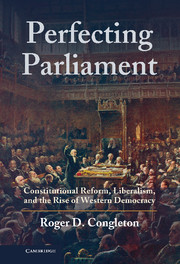Book contents
- Frontmatter
- Contents
- Preface
- 1 On the Origins of Western Democracy
- Part I Sharing Sovereignty
- Part II Historical Evidence on Western Democratic Transitions
- 9 Setting the Stage
- 10 Liberalism and Reform in the Transformative Century
- 11 Fine-Grained Constitutional Bargaining
- 12 An Overview of British Constitutional History
- 13 Constitutional Exchange in the United Kingdom
- 14 The Swedish Transition to Democracy
- 15 Constitutional Reform in the Netherlands
- 16 Germany
- 17 The Japanese Transition to Democracy and Back
- 18 The United States, an Exception or Further Illustration?
- Part III Analytical History as Social Science
- Appendix Methodological Approach, Limits, and Extensions
- References
- Index
9 - Setting the Stage
Philosophical, Economic, and Political Developments Prior to the Nineteenth Century
Published online by Cambridge University Press: 05 June 2012
- Frontmatter
- Contents
- Preface
- 1 On the Origins of Western Democracy
- Part I Sharing Sovereignty
- Part II Historical Evidence on Western Democratic Transitions
- 9 Setting the Stage
- 10 Liberalism and Reform in the Transformative Century
- 11 Fine-Grained Constitutional Bargaining
- 12 An Overview of British Constitutional History
- 13 Constitutional Exchange in the United Kingdom
- 14 The Swedish Transition to Democracy
- 15 Constitutional Reform in the Netherlands
- 16 Germany
- 17 The Japanese Transition to Democracy and Back
- 18 The United States, an Exception or Further Illustration?
- Part III Analytical History as Social Science
- Appendix Methodological Approach, Limits, and Extensions
- References
- Index
Summary
From Autocracy to Democracy Without Revolution
Part I of this volume suggests that the king-and-council template is a robust architecture for governance. It is a template for governance that solves various information and succession problems and can be adjusted at many margins as circumstances change. Particular instances of it divide policy-making authority between the king (the executive) and the council (the parliament or legislature). Insofar as a particular assignment of policy-making authority is sufficiently stable that it can be taken as given by those holding positions within government, the officeholders know what their authority is, and what is required for policy decisions of various kinds to be made and implemented.
The initial division of authority advances the interests of the founding formeteur(s), and the political property rights thereby established provide the basis for both continuity in governance and constitutional reform.
- Type
- Chapter
- Information
- Perfecting ParliamentConstitutional Reform, Liberalism, and the Rise of Western Democracy, pp. 187 - 220Publisher: Cambridge University PressPrint publication year: 2010

